White Movement Top
Soviet Russia in the ring of fronts
September and October of the 1919 of the year were the time of the maximum success of anti-Soviet forces. The Red Army was defeated on most fronts and directions. In August, Denikin’s army occupied New Russia and the Left Bank of Little Russia (Victories of Denikin’s army in New Russia and Little Russia) Almost the entire Right-Bank Little Russia was conquered by Petliurists. Polish troops captured the West Russian lands, reached the border of the river. Berezina. In early September, the Lithuanian army went on the offensive.
Miller’s White Northern Army launched a successful offensive on the Northern Front in September. Yudenich’s northwestern army at the end of September - October launched an offensive on Petrograd, fought stubborn battles at the Pulkovo Heights (Operation "White Sword". Beat at the heart of the revolution; "Do not give up Petrograd!") On the Eastern Front in September 1919, even the already defeated Kolchak army went on their last offensive (Pyrrhic victory of the Kolchak armies on Tobol) Kolchakites were able to repel the offensive of the 5 and 3 red armies, and push the enemy back to Tobol.
The Ural army, led by General Tolstov, was able in September to organize a successful raid on the rear of the Reds, the White Cossacks destroyed the entire headquarters of the 25 Infantry Division in Lbischensk, which was also the headquarters of the entire army group of the Red Army of the Turkestan Front, including the division commander Chapaev. As a result, the troops of the Turkestan Front lost control, decomposed and were demoralized. The red units hastily retreated to their original positions, to Uralsk. The Ural Cossacks recaptured almost the entire territory that the Reds occupied for three months. Belokazaki in October again surrounded and besieged Uralsk.
Northern front
The northern front was created by the British. Here, unlike the Northwestern Front, the British supported the whites in the most active way. In the Arkhangelsk region, interventionists lingered longer than in other provinces of Russia. This was due to the presence of huge stocks of military materials in the local ports created back during World War II, and Western troops landed to capture them. Part of these reserves were planned to be transferred to the Kolchak army. At the same time, the interventionists focused on the rear, security service. They were in no hurry to the front line. Only foreign volunteers, for example, Australians, fought on the front lines. Their detachment was formed from hunters who were well-versed in Russian forests and swamps. Mixed Slavic-British legions were also formed.
All attempts at offensive operations in the direction of Kotlas-Vyatka, conceived by the commander of the allied forces in the North of Russia, General E. Ironside, did not lead to success. The direction of the offensive to the east, in fact, is auxiliary, from the very beginning it did not promise success. The terrain here was mostly deserted, there were no material resources for supplying troops on the ground. A huge territory, a small amount of communications and impassable slaughter until the end of summer. A few roads, including railways, were well covered on both sides by sturdy outposts and fortifications, the breakthrough of which was worth great losses. Therefore, the war in the north was mainly positional, without maneuvering breakthroughs as in the south or east of the country.
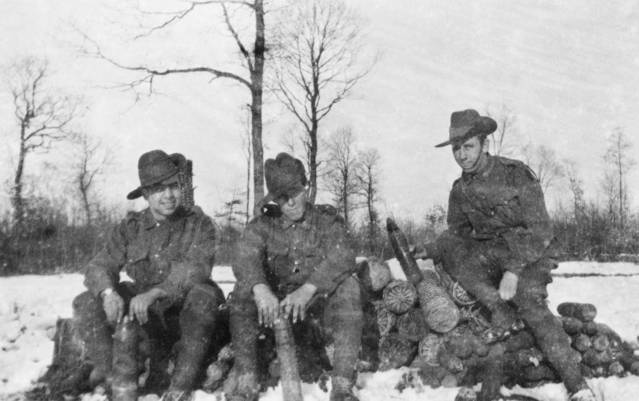
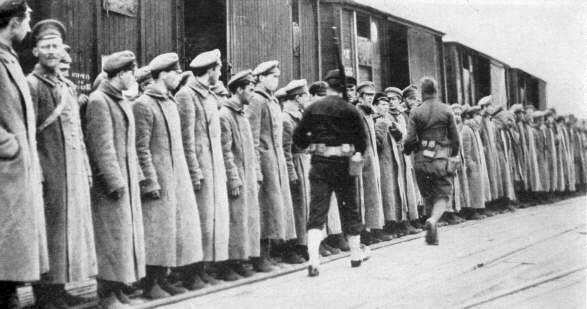
In January 1919, the Governor-General of the Northern Region became Lieutenant General E.K. Miller, and in May - the Commander of the Northern Army (before that, General V. Marushevsky was the commander). By that time, the number of the Northern Army totaled about 9,5 thousand people. Her formation went slowly. The officer’s core was weak and small (there were few officers in the North, most fled to the South of Russia). Due to the extremely low influx of volunteers into the army, universal military service was introduced, but this did not help much. The forced nature of the mobilization led to the fact that discipline in the army was weak, desertion flourished, there was the possibility of rebellion and the transfer of troops to the side of the Reds. This was facilitated by the fact that captured Red Army soldiers were included in the Northern Army. In addition, the British at first did not pursue a tough policy with respect to captive Bolsheviks and Red Army soldiers. Many directly from prisons were sent by volunteers to formed regiments, which strengthened the pro-Soviet sentiment in the troops.
This led to a series of uprisings at the front - in Pinega, 8-m North Regiment. In the Dvina fortified area, the battalion of the 3 North Regiment rebelled. The Dyer battalion revolted, where the command was mixed (British and Russian officers), the soldiers killed their officers. The 5th North Regiment on Onega rebelled, the soldiers led some of the officers to the Reds. There were other rebellions, or their attempts. They were crushed, but the situation was tense.
It is also worth noting that the inhabitants of the rich villages of the North, with their own fisheries, as well as the cities of Arkhangelsk, Kholmogor, Onega, where the illegal propaganda of the Bolsheviks and legal propaganda of the Socialist-Revolutionaries flourished, did not want to fight and did not support the interventionists and White Guards. The population as a whole was hostile towards foreigners. Thus, the social base of whites in the North of Russia was weak.
Despite all the problems, by the summer of 1919, the Northern Army numbered 25 thousand people (most of them were captured Red Army soldiers). British and Russian military schools were opened to train officers. In August 1919, the infantry units of the Northern Army consisted of six infantry brigades.
Meanwhile, the situation on the Northern Front has changed dramatically. The British press harshly criticized General Ironside, he was accused of the death of British officers, of excessive optimism about the sentiments of the Russian people and the Russian army. In parliament, there were demands to withdraw troops to their homeland. And the main declared goal, the connection with the army of Kolchak in the east, was not achieved. Kolchakites rolled back farther east. The plan for any connection with Kolchak’s army became impracticable. As a result, it was decided to evacuate troops from the North of Russia. In July, General Roulison arrived in Arkhangelsk to solve this problem.
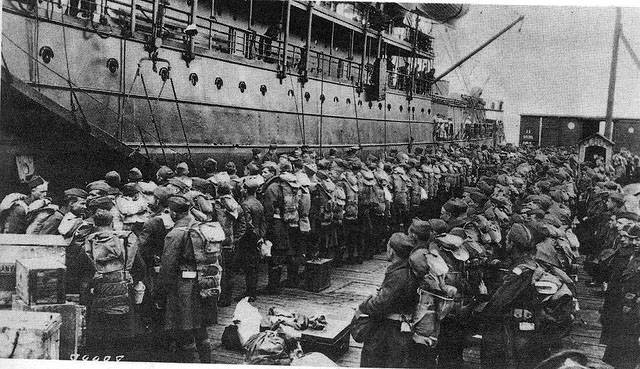
The British, together with the White Guards, carried out the last successful Dvina operation. And then the Westerners decided to evacuate. Unlike the French in Odessa, the British prepared well and thoroughly. Selected troops from the Scottish riflemen arrived to ensure the evacuation. The removal of troops provided the whole fleet. The British also offered to evacuate the Northern Army and take it to Murmansk, or to another front — the North-West or South. In August 1919, a military meeting of the Northern Army was held on the topic of evacuation.
There were many pros: there were practically no escape routes; in case of failure at the front, the army was doomed to death; when the navigation was completed, the sea froze, it was impossible to pass; the Russian ships did not have coal, but the British could not deliver it; the rear after the British left remained unsecured, the Northern Army did not even have its rear service; the commanders had doubts about the reliability of the troops. Therefore, almost all regiment commanders favored leaving with the British. A compromise option was also proposed: to transfer, with the help of the British, the most reliable part of the army to Murmansk. Take away all ships and supplies, evacuate the loyal part of the population. And then, relying on the rich Murmansk warehouses, to attack Petrozavodsk, helping the Yudenich’s Northwest Army in operations against red Petrograd. In case of failure, one could retreat from Murmansk - next to Finland and Norway, the ice-free sea.
The commander’s headquarters offered to stay. Like, the positions are strong, and it will be politically correct to stay in Arkhangelsk. The liquidation of the Northern Front will cause a resonance negative for the White Movement. It seemed impossible to retreat without strong enemy pressure and the threat of defeat, with success at the front (albeit local), with the support of part of the population. In addition, the command of the Northern Front hoped for the success of the white armies on other fronts. It was a time of maximum success for the White Guards. Successfully attacked Denikin’s army in southern Russia, prepared a strike on Petrograd Yudenich, and Kolchak was not yet defeated. Thus, an erroneous decision was made to stay and fight alone.
Instead of evacuation, the white command decided to organize a general offensive. In Arkhangelsk, the formation of militias of the Northern Region began, for the security service instead of the departing English. The offensive of the Northern Army began in early September 1919. Surprisingly, it initially developed successfully. The White Guards again captured Onega with the surrounding area. White has advanced in other directions. Thousands of Red Army soldiers were captured. The Red Command in this area did not wait for the active actions of the Northern Army at the time of the evacuation of the British. It was assumed, on the contrary, that White, after the departure of the patrons, would go on the defensive. Therefore, the enemy attack missed. In addition, the White Guards were encouraged by victories on other fronts, hoping that their advance would become part of a common victory.
At this time, the British evacuated and destroyed a huge amount of property and stocks that they could not take out. Airplanes, cars, ammunition, uniforms, provisions were drowned and burned. All this was done in broad daylight, with witnesses, causing painful sensations in the remaining. To the surprised inquiries of local authorities, the British replied that they were destroying the surplus, that the Northern Army had been provided with excess, and that the excess was being destroyed so that it did not fall into the hands of the Bolsheviks, since the British did not believe that the White Guards could not survive without them. On the night of 26 on 27 of September 1919, the last military Entente left Arkhangelsk, and on October 12 they left Murmansk.
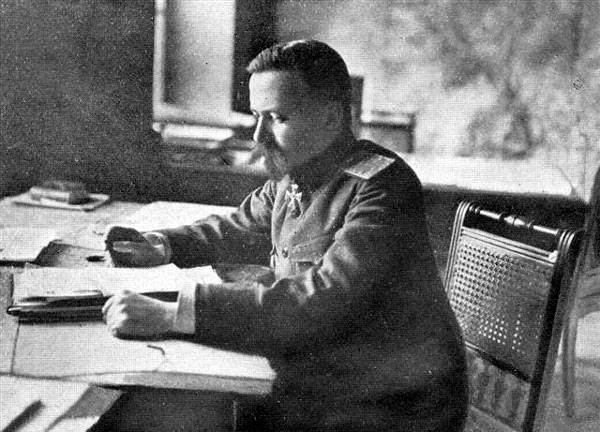
Turkestan: Basmachi and peasant rebels against the Reds
The Bolsheviks had a tight time in Turkestan. At the peak of its activity, the army of Madamin Bek Basmachi reached 30 thousand fighters and controlled almost the entire Ferghana Valley with the exception of large cities and railways. The second powerful force in Turkestan was the Peasant Army under the command of Konstantin Monstrov. Initially, it was formed from Russian peasant immigrants who created self-defense units to combat the predatory attacks of the Basmachis. At first, the Peasant Army was subordinate to the command of the Ferghana Front, collaborated with the Soviet government. At this time, the Monster army received material supplies from the Reds, weapon and ammunition. However, as a result of the Bolsheviks' anti-peasant land and food policy (bread monopoly, food dictatorship) and attempts to select the land of Russian immigrants in favor of dekhkans (Central Asian peasants), the attitude of peasant leaders towards the Reds changed. In addition, the Red Command, realizing the unreliability of the peasant formation, first tried to intervene in the internal affairs of the army, and then abolish the headquarters and subjugate the Peasant Army to itself. This caused a conflict, the headquarters of the Peasant Army refused to comply.
At the same time, one of the leaders of the Ferghana Basmachi, Madamin Bek, tried to lure the commanders of the Peasant Army to his side. He forbade subordinate units to attack Russian settlements and began to attack the Basmachi, who were noted in acts of terror against Russian peasants. In the summer of 1919, the leadership of the Peasant Army concluded a non-aggression agreement with Madamin Bek. Having learned about these negotiations, the Red Command twice tried to disarm the Peasant Army by sending several red detachments to Jalal-Abad (the center of the Peasant Army), but without success.
In June 1919, a bread monopoly was declared in the Turkestan Soviet Republic. In response, the military council of the Peasant Army finally broke with the Bolsheviks and revolted. In August, a meeting of representatives of the Kolchak army, the leaders of the Peasant Army and the leaders of the Basmachi was held in Jalal-Abad. The peasant army entered into an anti-Bolshevik alliance with Madamin Bek. The united army of Madamin Bek and Monstrov in September was replenished by Cossacks who arrived from Semirechye.
In addition, a new front arose in the western part of Turkestan - in the Khiva Khanate. There, one of the leaders of the Basmachi, Dzhunaid Khan (Mohammed-Kurban Serdar), overthrew and killed Asfandiyar Khan, put in his place a puppet - the brother of Asfandiyar Khan, Said Abdullah Khan (reigned before 1920). Dzhunaid Khan, having received military assistance from the army of Kolchak, began the war against Soviet Turkestan.
In early September, the combined anti-Bolshevik forces captured the city of Osh. On the side of the Peasant Army crossed some red detachments. The commander of the Ferghana Front, Safonov tried to crush the rebellion, but was defeated. After the capture of Osh, the rebels launched an offensive on the cities of Andijan and Skobelev (now Ferghana). The siege of Andijan continued until September 24. The Andijan garrison, where there were many internationalists, stubbornly resisted. The rebels were able to take almost the entire city, except for the fortress, where the remains of the garrison hid.
True, the success of the uprising was short-lived. At this time, the Red Command, sent reinforcements to Ferghana. To help from the Trans-Caspian Front, the Kazan consolidated regiment arrived, transferred to Andijan on 22 of September. Also from Skobelev arrived a detachment of Safonov. The Reds scattered the rebels near Andijan. For the most part, rebel peasants begin to scatter home. The peasant garrison, which remained in the city of Osh, having heard about the defeat near Andijan, also fled. At the end of September 1919, the Reds occupied Osh and Jalal-Abad without much resistance. At the same time, the rebels still had an advantage in most rural areas, and the red ones in cities and the railway. The remnants of the Peasant Army and Madmin Bek’s Basmachi moved to the mountainous regions of Ferghana, where in October they created the Provisional Ferghana Government. He was headed by Madamin Bek, and Monstrov was the deputy. At the beginning of 1920, after a series of defeats, the Ferghana government "ceased to exist: Monsters surrendered to the Bolsheviks, Madamin Bek joined the Reds in March and was killed by irreconcilable Basmachi.
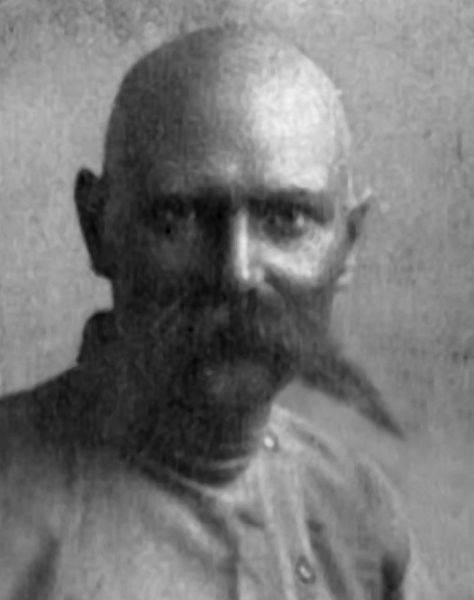
To be continued ...
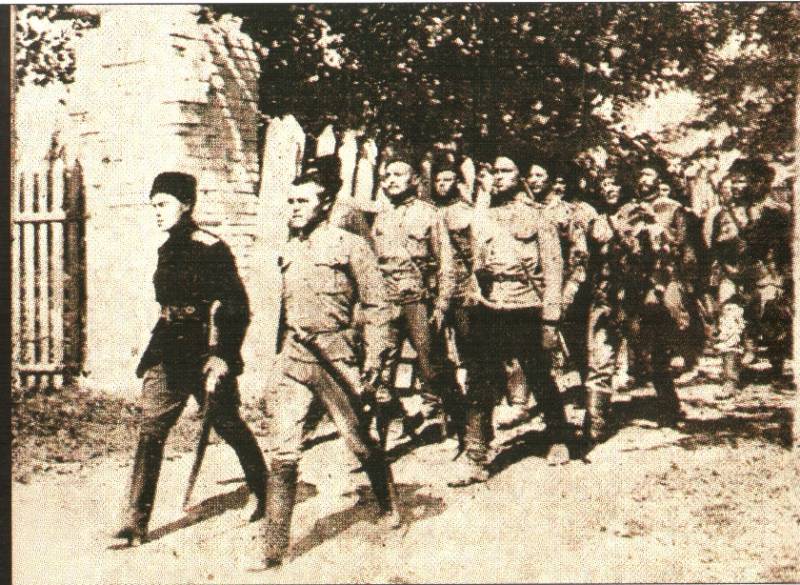
Information